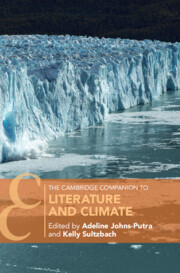Book contents
- The Cambridge Companion to Literature and Climate
- The Cambridge Companion to Literature and Climate
- Copyright page
- Contents
- Figures
- Notes on Contributors
- Introduction
- Part I Historical Shifts in Climate Consciousness
- Part II Current Issues in Climate Change Criticism
- 4 Scales
- 5 Capitalist Cultures
- 6 Animals and Extinction
- 7 Climate Justice and Literatures of the Global South
- Part III Ways of Telling Climate Stories
- Part IV Dialogic Perspectives on Emerging Questions
- Selected Bibliography
- Index
- Cambridge Companions to …
4 - Scales
Climate versus Embodiment
from Part II - Current Issues in Climate Change Criticism
Published online by Cambridge University Press: 31 March 2022
- The Cambridge Companion to Literature and Climate
- The Cambridge Companion to Literature and Climate
- Copyright page
- Contents
- Figures
- Notes on Contributors
- Introduction
- Part I Historical Shifts in Climate Consciousness
- Part II Current Issues in Climate Change Criticism
- 4 Scales
- 5 Capitalist Cultures
- 6 Animals and Extinction
- 7 Climate Justice and Literatures of the Global South
- Part III Ways of Telling Climate Stories
- Part IV Dialogic Perspectives on Emerging Questions
- Selected Bibliography
- Index
- Cambridge Companions to …
Summary
Critical questions about the relation between literature and climate are relevant both before and after the rise of environmentalism and today’s climate politics. How does literature write the encounter between biological bodies and climate? What trends in literary form and content do critics track when they study climate change? What concepts have they then created or rethought? To answer these questions, we need to look outside the contemporary moment and compare historical periods. This chapter looks at four topics: the ‘superorganism’, the climate theory of race, the concepts of ‘hyperobject’ and ‘trans-corporeality’, and the idea that literature can ‘model’ anthropogenic climates. The Anthropocene has certainly created new configurations of climate and embodiment coupled to changes in literary form, including what sort of narrative worlds seem real to their readers. But none of this is unprecedented. Present configurations of embodiment, climate, and form are still constrained by those of the past. Critics are only beginning to understand what they are, and how they change in historical time.
Keywords
- Type
- Chapter
- Information
- The Cambridge Companion to Literature and Climate , pp. 71 - 86Publisher: Cambridge University PressPrint publication year: 2022
- 2
- Cited by

